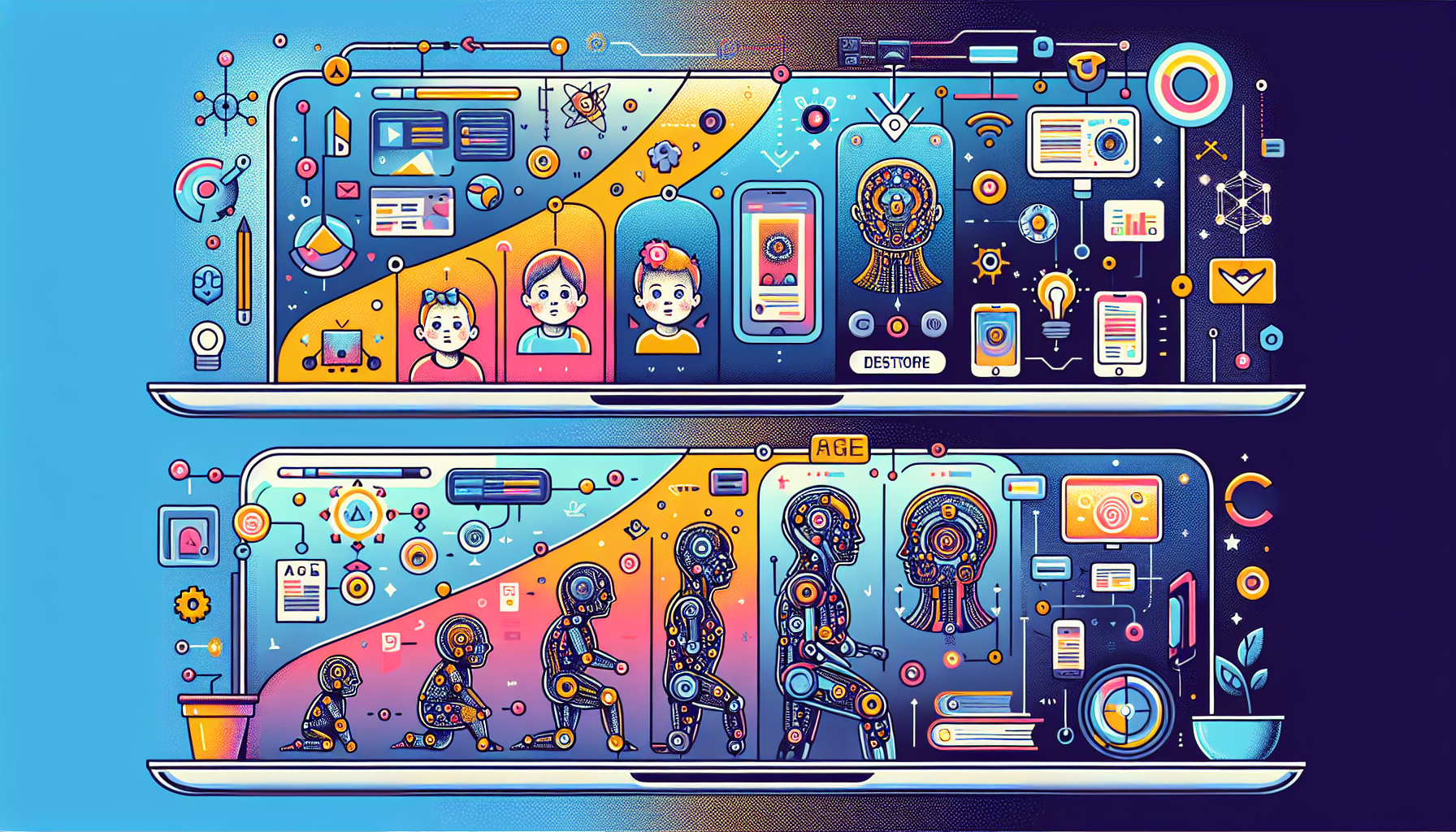AI for the Next Generation: Google Opens Gemini Access to Children Under Family Link Supervision
In a significant move that signals the mainstreaming of artificial intelligence for all age groups, Google has announced plans to extend access to its Gemini AI chatbot to users under 13 years old through its Family Link service. This development, reported by The Verge on May 3, 2025, marks an important milestone in how AI technologies are being integrated into young users' digital experiences while raising important questions about digital literacy, safety, and the future of human-AI interaction across generations.
Understanding Google's Expansion of Gemini to Younger Users
Google's Gemini, the company's advanced AI assistant that competes with OpenAI's ChatGPT and Anthropic's Claude, has previously been restricted to users 13 and older in compliance with children's online privacy regulations. The new initiative will specifically target children whose accounts are already managed through Google Family Link, the company's parental control system that allows parents to supervise their children's digital activities, manage screen time, and approve app downloads.
This carefully structured approach suggests Google is cognizant of the sensitivities around AI exposure for younger users. By limiting Gemini access to Family Link-managed accounts, the company ensures that parents maintain oversight of their children's interactions with the AI system. This approach aligns with growing recognition that as AI becomes more embedded in everyday technology, creating age-appropriate pathways for responsible use becomes increasingly important.

The specifics of how Gemini will be tailored for younger users haven't been fully disclosed, but we can expect a more restricted version that likely includes:
- Stronger content filters to prevent inappropriate responses
- Simplified interfaces designed for younger users
- Enhanced educational capabilities to support learning
- Parental reporting features that provide visibility into AI interactions
- Limited functionality compared to the full adult version
The Technical and Ethical Implications of AI for Children
From a technical perspective, crafting AI systems that are both engaging and appropriate for children presents unique challenges. AI models like Gemini are trained on vast datasets of internet content that include materials unsuitable for children. Creating effective guardrails requires sophisticated content filtering, intention recognition, and context awareness that can distinguish between appropriate educational responses and potentially harmful content.
Google will likely employ several technical approaches to make Gemini child-friendly:
- Additional model fine-tuning specifically for child-appropriate responses
- Real-time content filtering with higher sensitivity thresholds
- Topic restrictions that limit responses in sensitive areas
- Educational focus that prioritizes learning opportunities
- Simplified language models that match children's comprehension levels
The ethical dimensions are equally complex. As AI systems become increasingly advanced at mimicking human conversation, questions arise about how early exposure might affect children's social development, critical thinking skills, and understanding of the difference between human and machine intelligence. Will children who grow up with AI assistants develop different cognitive patterns or expectations around information retrieval and problem-solving?
AI Literacy as the New Digital Literacy
Google's move reflects a broader recognition that AI literacy is becoming as fundamental as digital literacy. As large language models and other AI systems become embedded in everything from homework help to creative tools, understanding how to effectively and responsibly use these technologies becomes an essential skill.
For children, developing healthy AI interaction patterns early could provide advantages in a world where AI collaboration will likely be central to many future careers. Parents and educators will need to guide children in understanding:
- The capabilities and limitations of AI systems
- How to verify information provided by AI
- Appropriate use cases for AI assistance
- The importance of maintaining human critical thinking
- Privacy considerations when interacting with AI
This development aligns with trends we're seeing across the educational technology landscape, where AI-assisted learning tools are becoming increasingly common in classrooms and homework environments. Google's approach appears to recognize that supervised early exposure may be preferable to children encountering AI tools without guidance or structure.
Industry Trends: The Race for Generational AI Adoption
Google's decision to extend Gemini access to younger users reflects broader competitive dynamics in the AI industry. As major technology companies invest billions in developing and deploying advanced AI systems, capturing younger users represents both a long-term strategic advantage and a way to normalize AI interaction across generations.
This move follows patterns we've seen with other technologies, where companies that successfully engage younger users often establish brand loyalty and usage patterns that persist into adulthood. For Google, introducing children to Gemini within a controlled environment could create a generation of users comfortable with its specific AI approach and interface conventions.
We're witnessing similar approaches across the technology landscape:
- Educational technology companies integrating AI tutors and assistants
- Child-focused tablets and devices adding voice assistants with parental controls
- Simplified coding platforms using AI to help children create applications
- Gaming platforms incorporating AI elements with age-appropriate safeguards
This trend of "AI for all ages" signals a significant shift in how these technologies are perceived—moving from specialized tools for professionals to everyday utilities accessible to users across the age spectrum.

Balancing Innovation with Protection
The challenge for Google—and indeed all companies introducing AI to younger users—lies in striking the right balance between encouraging beneficial exploration and maintaining appropriate safeguards. The Family Link framework provides an existing infrastructure for this balance, but the interactive nature of conversational AI creates new complexities.
Key considerations for child-safe AI implementation include:
- Transparency: Clear indication when children are interacting with an AI versus a human
- Content moderation: Preventing exposure to harmful, biased, or age-inappropriate material
- Data privacy: Special handling of data from minor users in compliance with regulations like COPPA
- Developmental appropriateness: Ensuring interactions support rather than hinder cognitive development
- Parental oversight: Meaningful controls that allow parents to guide AI usage
Google's approach through Family Link suggests an acknowledgment that AI access for children should be accompanied by parental involvement, rather than allowing unrestricted access. This framework could establish important precedents for how other companies approach similar challenges.
Implications for Organizations and Families
For organizations working with education technology or family-oriented digital services, Google's move signals an acceleration of AI integration across age groups. Companies will need to consider how their own services might adapt to a world where children increasingly expect AI-enhanced experiences while navigating the complex regulatory landscape surrounding children's digital privacy.
For families, this development presents both opportunities and challenges. Parents will need to develop their own AI literacy to effectively guide their children's usage. Educational opportunities may expand as children gain access to AI assistance for homework and creative projects, but boundaries around appropriate use will need to be established.
What This Means for Binbash Consulting Clients
For our clients at Binbash Consulting, Google's extension of Gemini to younger users highlights several important considerations:
- Infrastructure readiness: As AI usage expands across age demographics, organizations need infrastructure capable of supporting diverse AI applications with varying security and privacy requirements.
- Policy development: Companies working with family or educational services should review and update policies regarding AI interaction, particularly for under-13 users.
- Security implications: The expansion of AI to younger users may create new attack vectors that security teams should evaluate.
- Competitive landscape: Organizations offering family-oriented services should consider how AI capabilities might become expected features across age groups.
At Binbash, we recognize that responsible AI deployment requires thoughtful infrastructure design that accommodates both innovative capabilities and robust protections. As AI becomes an intergenerational technology, our commitment to helping clients build secure, scalable, and compliant systems becomes increasingly important.
Conclusion: Preparing for an AI-Integrated Future
Google's decision to extend Gemini access to children under Family Link supervision represents more than just a product update—it signals a future where AI literacy becomes a fundamental skill developed from an early age. As these technologies become further integrated into education, entertainment, and everyday digital experiences, the line between human and AI-assisted activities will continue to blur.
The organizations that thrive in this environment will be those that thoughtfully consider how to leverage AI capabilities across demographics while maintaining appropriate safeguards. At Binbash Consulting, we remain committed to helping our clients navigate this evolving landscape through infrastructure solutions that support responsible AI deployment, regardless of the user's age.
As this story develops, we'll continue monitoring Google's approach to child-safe AI implementation and the broader implications for technology infrastructure and security requirements.

